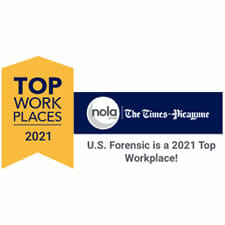Qualifications
U.S. Forensic ensures that our experts have the appropriate education and training to perform the forensic inspections in their fields of practice. At minimum, for engineers, we require a bachelor’s degree in engineering, and a Professional Engineering License (P.E.). We also seek candidates with specialized training, education and experience for particular positions. For example, many of our mechanical engineers that perform automotive evaluations have either worked as mechanics prior to pursuing their engineering degrees, have an ASE certification, or have worked in an automotive related field.
What Goes into Becoming a Professional Engineer?
The Professional Engineering (P.E.) designation means that an engineer is licensed. Not all engineers who practice, are licensed. U.S. Forensic, however, requires the P.E. designation for all of our engineers that conduct property evaluations or serve as an expert witness in the field of engineering. The licensing process required by most states includes:
- A four-year degree in engineering
- A minimum of four years of practicing engineering under the direction of a Professional Engineer (P.E.)
- Completing and passing rigorous comprehensive exams that test competency.
- A license issued by the engineering board of that state.
- Continuing education and ongoing learning/honing of skills.
Becoming a licensed engineer demonstrates that the professional is committed to operating at the highest level of his/her profession and takes seriously the ethics and principles that guide the engineering field.
Advanced Degrees
Our consultants and partners have practical experience acquired across an array of industries. Their combination of experience and educational training provide a rich resource for clients and colleagues alike. Many of our team members possess advanced degrees – approximately 39 master’s degrees and 7 doctoral degrees.
Training & Certifications
In addition to training provided by our Principal Engineers and Partners, U.S. Forensic encourages and provides opportunities for additional offsite training and certifications depending upon discipline and need. The certifications and training vary by each engineer. These may include but are not limited to:
Basic Wind Loads: ASCE
Building Pathology
BURSI: Fundamentals of Commercial Roofing
Certified Accelerant Detection K-9 Handler
Certified Asbestos Inspector
Certified Fire and Explosion Investigator (CFEI)
Certified Fire Investigator (CFI)
Certified Fire Investigation Technician for Motor Vehicle -IAAI FIT(V)
Certified Fire Investigation Technician -IAAI FIT
Certified Forensic Locksmith (CFL)
Certified Vehicle Fire Investigator (CVFI)
Construction Compliance with the ADA
Crash Data Retrieval Data Analyst Certification
Crash Data Retrieval Technician Certification
Crash Investigation
Engineering. Dynamics Corporation Reconstruction of Accident. Speeds on the Highway (EDCRASH)
Efflorescence: Causes and Cures
Engine Control Module ECM Crash Data Retrieval Training
EPA Certified Renovator
Flood Damages
Forensic Engineering Certification
Haag Certified Commercial Roof Inspector (HCI-C)
Haag Certified Residential Roof Inspector (HCI-R)
Haag Certified Inspector – Wind Damage (HCI-WD)
Heavy Vehicle Engine Data Recorder (HVEDR)
Hurricane Damage: Wind vs. Water Determination
Lead Paint Inspector
Level II Certified Infrared Thermographer (CIT)
Licensed Mold Assessment Consultant
Moisture Control in Brick Masonry
Mold Assessor
Motor Vehicle Inspector
National Highway Institute Bridge Inspector Certification
OSHA Safety Training
Plastic Failure
Professional Equipment: Moister Meter Course
Registered Roof Observer (RRO)
SCUBA – Certified for Underwater Structural Inspections
Special Inspector
Traffic Accident Investigation



